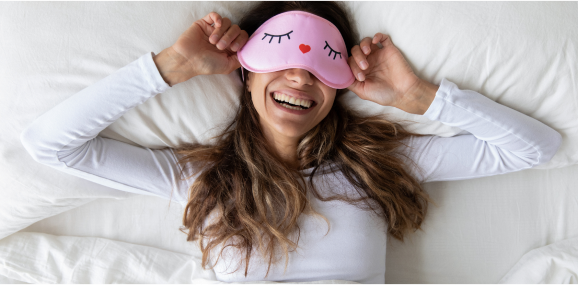Stress, pressure, and other life factors can have an immense impact on sleep regardless of age, and teens struggle with sleep problems just as much as adults.
Sleep is an incredibly important part of our lives, and it is essential to get enough sleep in order to support your overall well being. Are you yourself a teen, or do you have your own teen at home who is having an incredibly hard time sleeping?
We’ve got a few answers, suggestions, and even products that can help teens overcome sleeping difficulties in order to have a better night of rest.
The Importance of Sleep
Good sleep habits and sleep wake cycles are key for more than just your energy levels, and learning more about the different roles that sleep plays in your mental and physical health can keep you in the loop.
Some of the main functions of sleep are as follows.
Supports a Healthy Immune System
Getting enough sleep can help your body fight off infection, and keep you strong and healthy! Scientists have discovered that quality sleep can support the cells in your body as they fight off infection. Good sleep does this by enhancing the ability of T cells to adhere to and destroy cells infected by viruses and other pathogens.
During sleep, your immune system releases protective proteins called cytokines, some of which actually help promote sleep. If you’re not getting enough sleep, that lack of sleep can lead to a decrease in the production of these protective cytokines. When your body doesn’t get enough sleep, infection-fighting antibodies and cells become reduced, which increases your likelihood for illness.
Every age group has a designated amount of sleep they should be getting. The optimal amount of sleep for adults is about seven to eight hours of good sleep each night, whereas teenagers and high school students need around nine to ten hours of sleep.
Teenagers who are experiencing insomnia symptoms or symptoms of lack of sleep, like excessive daytime sleepiness or delayed sleep onset, may be struggling with sleeping disorders and even mental health issues.
It’s a vicious cycle -- not being able to sleep enough causes even more repercussions. But there are ways to break the cycle of poor teen sleep.
Increases Productivity and Concentration
Ever doze off during work at your desk? It’s most likely because you didn’t get enough sleep and it’s impacting your productivity and concentration at work, school, or in everyday activities or relationships.
Scientists who have measured sleep and its impact on the brain have found that sleep deprivation leads to lower alertness and inability to concentrate. Difficulty to focus and pay attention are directly related to lack of sleep, and can cause mental fog, which hampers your ability to perform tasks that require logical reasoning or complex thinking. Sleep deprivation also impairs judgment, making normal tasks such as driving difficult and even dangerous.
Lack of sleep has been shown to negatively impact children’s behavior, as well as academic performance, and may worsen attention-deficit hyperactivity disorder or ADHD symptoms. Low grades in school may not be linked to lack of understanding, but rather a disrupted sleep-wake cycle.
Without a full, quality night of sleep, it can cause adolescents to lose productivity and ability to concentrate when completing normal everyday activities.
Impacts Memory
Sleep impacts the brain’s ability to have memories and increase memory retention. The nerve connections that make our memories are actually strengthened during sleep.
Assistant Professor at the University of Maryland School of Medicine, Avelino Verceles says, “Sleep embeds the things that we have learned and experienced over the course of the day into our short-term memory.”
The different stages of sleep, also known as non-REM sleep and REM sleep, play different roles in the consolidation of new information into memories. Non-REM sleep is when you reach your deepest, highest quality sleep. Without it, your brain’s ability to retain memories is compromised.
Inability to focus or concentrate caused by sleep deprivation further weakens memory. “If you’re not able to concentrate on what’s at hand, it’s not going to make it into your short-term memory, and then further, your long-term memory,” says Allison T. Siebern, PhD, a Fellow in the Insomnia and Behavioral Sleep Medicine Program at the Stanford University Sleep Medicine Center.
Without a proper sleep schedule, your memory can be negatively impacted and can even cause problems or medical conditions later down the road if not treated and attended to.
Supports Mental Health
Sleep holds a large importance in the brain, and adequate sleep is incredibly vital when it comes to mental health.
Countless research has been conducted to show the link between sleep deprivation and depression. One specific study examined patterns of death by suicide over the course of ten years and it was concluded that lack of sleep was a contributing factor to many of those tragic deaths.
There has also been a direct link through studies that suggests people with sleeping disorders such as insomnia or sleep apnea are more likely to show signs of depression.
Tiredness largely impacts the brain and causes irritability, anger, and a reduced ability to cope with stressors. Polled by the NSF, National Science Foundation, sleep deprived people were less likely than those who sleep well to exercise, eat healthy, have sex, and engage in leisure activies.
Chronic sleep deprivation increases risk for depression. In fact, they are so closely linked that sleep specialists often struggle to identify which came first in their patients.
Keeps Inflammation Lower in the Body
Reduced swelling in the body and getting adequate sleep may be directly linked. In a study conducted by the World Journal of Gastroenterology, it was suggested a direct link between sleep deprivation and inflammatory bowel diseases that negatively affect people’s gastrointestinal tract.
Sleep deprivation can also contribute to these diseases, and these diseases can cause lack of sleep. This vicious cycle may seem impossible to overcome, but there are ways for teens to get more sleep each night.
Tips To Help Adolescents Sleep
The rate of sleeping disorders like insomnia in teens remain as high as 23.8%. This suggests that it is the most common sleep disorder in this age group.
Insomnia is a sleep disorder that makes it increasingly difficult to fall asleep or stay asleep, or causes you to wake up too early and be unable to go back to sleep. Insomnia has been known to cause reduced energy levels and altered moods, and can impact your health, work performance, and even quality of life.
A few symptoms of insomnia include:
- Not feeling well rested after a night of sleep
- Daytime tiredness or sleepiness
- Irritability
- Depression and anxiety
- Difficulty focusing
- Increased errors or accidents
- Ongoing stress about sleep and sleeping
A large portion of teenagers and adolescents deal with insomnia, obstructive sleep apnea, restless leg syndrome, or another sleep disorder on a daily basis.
If you or a loved one are struggling with mental illness alongside sleeping difficulties, consult a professional to learn about treatment options like antidepressants or cognitive behavioral therapy.
Keep a Routine for Sleep
Our brains thrive with a steady routine! Routines help our brain conserve energy and can make us more efficient at what we’re doing. Creating a relaxing bedtime routine could be largely beneficial when getting your sleep life back on track.
Strive to go to bed at the same time every night and set an alarm for the next day at the same time every day.
And yes, that includes weekends (at least for the most part — you can sleep in once in a while without ruining your routine).
Soon enough, you will start to become tired around the time you go to bed, and wake up the next day without your alarm clock. Try to avoid that afternoon nap, as it may be damaging your overall sleep schedule more than you think. Your circadian rhythm will thank you!
For teenagers, this routine will be beneficial since they already need a regular sleep/wake schedule for school. Make sure to go to bed on time to get at least nine hours of good, quality sleep!
Put the Phone Away
We know. This can be tough, especially for teenagers with a large social network, but it’s necessary! The blue light that emits from your phone and other electronic devices such as iPads, computers, and TVs actually suppresses the body’s release of the sleep hormone, melatonin.
Being exposed to blue light too close to bedtime can trick our brains into thinking it’s still daytime, which further disrupts the circadian rhythm and leaves us feeling alert instead of tired.
However, properly timed exposure to blue light may actually help treat several sleep disorders. Circadian rhythm disorders occur when a person’s circadian rhythms aren’t in alignment with their environment. Blue light can help realign the body’s circadian rhythm and improve sleep if used at the correct time.
So, put the phone away at least an hour before you plan on going to bed and read a good book instead.
Try Out the Sleep Pod Blanket
The blanket that’s taking over the internet has good reason to. It helps promote sleep and calm feelings of anxiety all while keeping you comfy and cozy. Known as the blanket that hugs you back, the Hug Sleep Sleep Pod has designed a blanket backed by science.
Based on Deep Touch Pressure Therapy, or DTP, the Hug Sleep blanket administers gentle, calming pressure to the entire body and provides comfort-inducing relaxation. The Sleep Pod’s unique cocoon-like shape wraps you up and helps to reduce tension while getting your body and mind ready for sleep.
Deep Touch Pressure Therapy can help relax the nervous system. This pressure therapy works to create an overall sense of calm and well-being by helping release the neurotransmitters serotonin and dopamine. DTP also helps to decrease the level of cortisol in the body, also known as the stress hormone.
Hug Sleep is made from a specialized 4-way stretch material that is breathable, doesn’t trap heat, is lightweight, and is even machine washable! Teenagers and adolescents can wrap themselves up in their Hug Sleep with different sizes for both adults and kids and the teens in between.
Watch What You’re Eating Before Bed
What you’re eating and drinking before you lie down for bed could be impacting your ability to get enough sleep or fall asleep at all.
If you eat a large meal before bed, your body may still be digesting and working as you’re trying to relax and go to sleep. Even more, if you have drinks with caffeine too close to bedtime, this could also inhibit your ability to fall asleep.
High carbohydrate meals have particularly been known to impair sleep quality. High intake of carbohydrates can increase how often you wake up in the middle of the night and reduce the amount of deep, quality sleep you’re able to get.
Conquer Insomnia With Better Sleep
Managing teen insomnia is possible, and it doesn’t have to rule you or your teen’s life! Not getting enough sleep can lead to serious health conditions and overall lack of wellbeing if not treated.
Make a strict schedule for falling asleep and waking up, put the phone away before bed, try out the comfy Hug Sleep, and watch what you’re eating before bed and watch as you get your sleep back.
Consult a doctor if your insomnia doesn’t seem to be improving with a few lifestyle changes.
Sources:
Sleep and Immune System | Healthline
Lack of sleep: Can it make you sick? | Mayo Clinic
Sleepiness: Cognitive and Emotional Effects | WebMD
Sleep, immunity and inflammation in gastrointestinal disorders | NCBI
Insomnia in Adolescence | NCBI
Insomnia - Symptoms and causes | Mayo Clinic
Habits and brain research | Sanitas magazine
How Blue Light Affects Sleep | Sleep Foundation
Nutrition and Sleep: Diet's Effect on Sleep | Sleep Foundation

































500,000+ happy customers